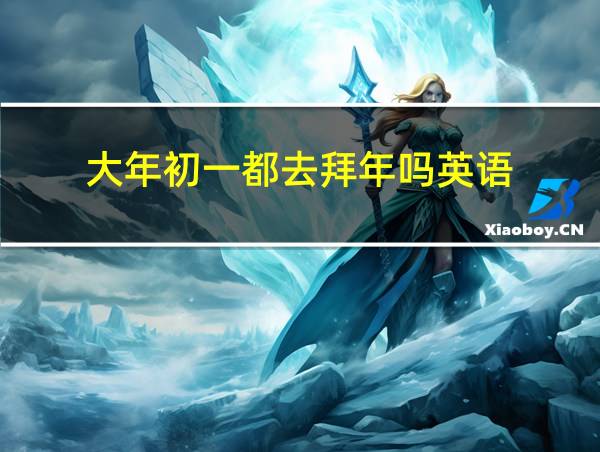大年初一都去拜年吗英语

到了大年初一我们去拜年的英文
On the first day of the Lunar New Year, it is a tradition for us to visit each other and exchange New Year\'s greetings.
拜年 (bài nián) is the term used in the Chinese culture to describe the act of paying respects and offering good wishes during the New Year celebration. It is a significant social activity that helps to strengthen family bonds and maintain harmonious relationships with friends and relatives.
The tradition of visiting each other on the first day of the new year dates back centuries and is deeply rooted in Chinese culture. It is believed that by visiting friends and family, one can bring good luck and blessings for the coming year. It is also an opportunity to express gratitude and well wishes to loved ones.
英语翻译翻译:“在春节我们拜年可以得到红包,可以与亲戚朋友...
During the Spring Festival, besides exchanging greetings and blessings, one of the highlights is receiving red envelopes (hóng bāo) filled with money. Red envelopes symbolize good luck and prosperity, and they are given as a gesture of goodwill and blessings for the new year. It is a tradition that brings joy and excitement, especially for children.
在中国文化中,红包是一种重要的表达祝福和欢乐的方式。拜年过程中,亲戚和朋友会给小孩子发红包,这让孩子们感到开心和受宠。据统计,每年中国人在春节期间发放的红包金额都会创下惊人的数字。
农历、过年、除夕之夜、年初一、元宵节、正月十五...
Chinese New Year, also known as the Spring Festival, follows the lunar calendar and typically falls between late January and early February. It is celebrated over a period of 15 days, starting from the eve of the Lunar New Year, also known as New Year\'s Eve, and culminating with the Lantern Festival on the fifteenth day of the first lunar month.
过年 (guò nián) is the Chinese term for celebrating the New Year. It is a time when families gather for reunion dinners and engage in various traditional activities such as setting off fireworks, giving red envelopes, and enjoying delicious meals together. The atmosphere is filled with joy, excitement, and anticipation for the upcoming year.
【英语翻译将以下句子翻译为英语:春节在中国是一个非常重要...
Spring Festival is a very important holiday in China, which falls usually in February. During the festival, people celebrate with great enthusiasm and excitement. The streets and houses are decorated with red lanterns and traditional Chinese decorations. Families come together for reunion dinners, exchange gifts and good wishes, and watch festive performances like dragon and lion dances.
The significance of Spring Festival lies in its representation of new beginnings, hope, and fortune. It is a time for people to reflect on the past year, express gratitude, and set new goals for the year ahead. The festival also plays a crucial role in promoting Chinese culture and strengthening family ties.
初一拜年祝福语英语?
When it comes to expressing New Year\'s greetings on the first day of the Lunar New Year, you can use the following phrases in English:
- \"Happy New Year!\" - A simple and common greeting to wish someone a joyful new year.
- \"Wishing you a Happy New Year\" - A more formal way of expressing good wishes for the new year.
- \"May the new year bring you happiness and prosperity\" - A wish for abundance and success in the coming year.
Remember to deliver these greetings with a warm smile and sincere intentions to convey your well wishes to your friends and family.
关于春节的英语单词?
Here are some English words related to the Spring Festival:
- The Spring Festival (春节 chūn jié)
- Lunar calendar (农历 nóng lì)
- Lunar January (正月 zhēng yuè)
- New Year\'s Eve (除夕 chú xī)
- The Lantern Festival (元宵节 yuán xiāo jié)
These words reflect the key elements and significant traditions associated with the Spring Festival celebration in China.
春节用英语怎么说请拼写
The translation for \"Spring Festival\" in English is spelled as \"Spring Festival\". The Spring Festival is the most distinctive and important traditional festival in China. It marks the end of the old lunar year and the beginning of a new year, ushering in the vibrant season of spring when people bid farewell to the cold and monotonous winter.
During this festive period, various cultural activities and customs are observed, such as dragon and lion dances, lantern displays, and the iconic firework shows. It is a time of joy, unity, and renewal, as people embrace the new year with optimism and hope for a prosperous future.
黄鼠狼和鸡拜年的英文
There is a traditional saying in Chinese: \"When the fox preaches, take care of your geese.\" This saying warns people to be cautious when someone with ill intentions offers goodwill. In this case, the phrase \"黄鼠狼给鸡拜年,没安好心\" translates to \"When the fox wishes the chicken a happy New Year, it is not sincere.\" It serves as a reminder to be wary of deceitful or insincere gestures during the New Year celebration.
过年好,给您拜年了!用英文怎么说呢?
A more appropriate way to say \"Happy Chinese New Year, I wish you a prosperous New Year\" in English would be:
\"Happy Chinese New Year! May the New Year bring you good fortune, health, and happiness.\"
It is customary to extend additional greetings and blessings during the New Year, such as:
- Wish you a prosperous New Year.
- May your dreams come true in the New Year.
- May you be blessed with abundance and success.
By expressing these wishes, you are conveying your sincere hopes for a joyful and prosperous year ahead for the person you are greeting.



